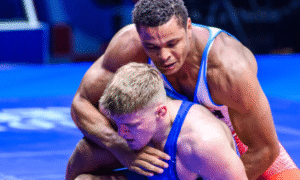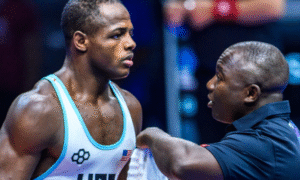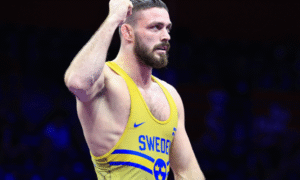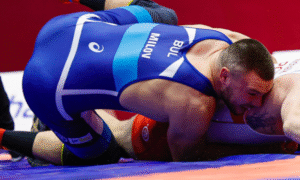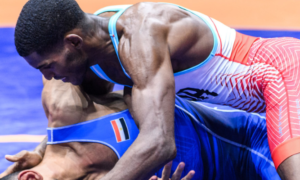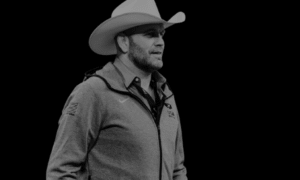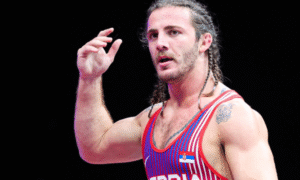The Team USA Juniors finished 10th at the 2018 World Championships, which is certainly solid, but also a slight downer if only because of the potential strength present throughout the lineup.
No hot takes here. A silver medalist, a bronze, and a fifth clearly demonstrate that things are tracking in the manner they should be. It is also the third year in a row the Americans have earned multiple Junior World medals, another huge positive.
But even with a roster that was rounded out by six first-time age-group World Teamers and a few others who were new to international competition altogether, the expectations were high. Large. Grand. Some of that had to do with 2017 Junior World Champion Kamal Bey (77 kg, Sunkist) having the chance to repeat, last year’s Cadet World gold Cohlton Schultz (130 kg, NYAC) being around to anchor, and 2016 Junior World bronze Taylor LaMont (60 kg, Sunkist) making his sixth-straight World Championships appearance. Nothing is automatic in this sport, but you could hardly be blamed if you had figured there would be more than a pair of medals coming from the entire group.
Then again, that’s why the Worlds are the Worlds.
And why the US is always struggling to show how good it can actually be.
WORD KEY: “Their” = other nations; “Our” = USA
Their Juniors — Learn, practice, and compete in Greco-Roman from an early age; receive countless opportunities to match-up internationally; are not wrestling another style eight (or nine) months out of the year.
Our Juniors — May learn, practice, and compete in Greco-Roman from an early age but mostly don’t; rarely match-up with international counterparts, though that is changing; include a majority who are wrestling another style eight (or nine) months out of the year.
Nate Engel and Herb House, the two experienced, passionate coaches who were tabbed to lead the 2018 Junior Team, understandably held high hopes for a history-making performance and they were correct to feel that way. This was an outstanding Team stocked with athletes who abided by their individual training plans and featured a couple of full-timers and seasoned, successful part-timers more than capable of going on a tear themselves.
But all in all, they had two weeks of combined training camp. Because, America.
It’s not because Engel, House, Matt Lindland, or Gary Mayabb wanted to cap them at only two weeks. It’s not because, or not necessarily because the athletes wanted to be capped at two weeks. This is just how the system is set up. The United States is vast. Athletes are well spread out. They have school, families, semblances of social lives. It costs money to get everyone together for any decent period of time. Not all training venues are always available.
There are logistical, financial, and geographical concerns that all play a role in determining why age-groupers only get a mere fortnight of high-level pre-Worlds training as a collective. You can’t point fingers here. If you try to, you’ll run out of…fingers.
And mind you, this does not fall on the 2018 boys. The Junior World Team was as prepared as it could possibly be given the situation. Every young man poured his heart out in Slovakia and competed to the best of his abilities when called upon.
The goal is for this material to serve as a reminder of the systemic issues still facing the US program and which have increased in their peril as the rest of the world continues to churn out Olympic hopefuls earlier and earlier. And to also once again serve as a reminder that when a young US Greco athlete is indeed successful on the World stage, it is in spite of circumstances, not because of them.
No one on the outside of the Greco community wants to hear excuses. That’s okay, and we’re all about done making them. But don’t let anyone tell you our athletes have any advantages, either.
Berreyesa & Schultz Lead the Way While Kamal Still Brings the House Down
Berreyesa
Andrew Berreyesa‘s (82 kg, NYAC/FLWC) march to the World finals was not startling for a few reasons. You can point to his battles with Tommy Brackett (NMU/OTS) and Zach Braunagel (Ill) this past spring for having helped Berreyesa further hone his ability to grind out big matches. The Junior Open and Trials might not be the World Championships and that’s fantastic, but there is something to be said for never having the easy road. Berreyesa was constantly tested domestically this season. He was astute enough to understand that each match in Slovakia was going to mean having to seize on the smallest of opportunities when available, and also, being able to out-hustle opponents during critical stages of the second period.
That par terre defense, though. The most glaring weakness in the US program proved to be one of Berreyesa’s biggest strengths last week when it absolutely mattered most — for it is par terre defense that guaranteed Berreyesa a medal.
Eventual bronze Muhutdin Saricicek (TUR) received both par terre chances against Berreyesa in their semifinal bout. And Saricicek never came all that close to getting a turn. There was a lot to be impressed by when it came to Berreyesa, but his semifinal victory over Saricicek is one that will be remembered for quite a while.
It didn’t go Berreyesa’s way in the final against Russian heir apparent Aleksandr Komarov. Berreyesa valiantly dug in and tried to pressure into position, Komarov was just too savvy and experienced to be caught off guard as they pummeled through the ties. Though the Russian, it wasn’t as if he was having a field day out there. Berreyesa held his ground through most of the first before getting put down, but that’s where a guy like Komarov makes his money. Two guts later it was 5-0 deficit for the US as the second period awaited. Komarov then took advantage of Berreyesa’s pressure with a two-on-one, got behind (whether or not legs aided in the sequence), and effectively ended it all with a throw.
Berreyesa will now begin focusing on his collegiate concerns at Cornell, but he’s not someone you worry about. It’s very obvious that this is in his blood, just like his bronze-medal-winning teammate below. You just can’t wait to see what else Berreyesa has in store and how much he’s improved the next time he crosses back over to the good side.
Schultz
Schultz. The wunderkind, the cat-like brute who, maybe more than anyone else in his age range, knows how to immediately punish an opponent for the even the slightest mistake. Schultz pinned dudes at the ’17 Cadet Worlds and he did so this year up a level. His first opponent last Monday, Lingzhe Meng (CHN), was not someone you pointed to as an automatic win. Not even close. Meng, a runner-up at the Hungarian Grand Prix in June, is one of the best opponents Schultz has ever faced in international competition. So there was a palpable rush when Schultz took a 3-1 first-period lead. Even more so when Schultz stepped over a Meng turn attempt to stick him early in the second.
Then there was that front headlock in the next match versus Junior European Championships gold Oleg Agankhanov (RUS). Agankhanov hung his head, Schultz vice-gripped a front headlock and started squeezing. Desperation, the need for oxygen, whatever Agankhanov’s deal was, he had no choice but to try and lever himself towards Schultz, who had no problem twisting down on his lock and coming up with what was another huge win via fall.
David Ovasapyan (ARM) managed to survive Schultz’s best efforts in the 130-kilogram semis by playing a loose game and bailing out of trouble whenever it appeared. Ovasapyan, who would place second to Iran’s Amin Mirzazadeh, was rewarded with a passive and scored on a step-out to come away with his two points. The pivotal moment of the bout occured in the second period. Schultz had finally received his passive/par terre chance but could not do anything with it because Ovasapyan smartly got up and out of dodge virtually as soon as the whistle blew.
Of course, Schultz didn’t wallow or hang his head. He waited a day and got the next best thing. Ante Milkovic (CRO), a wrestler Schultz became familiar with during a previous tour of Europe, did not have an answer for the technique or gas tank that he was forced to contend with. Schultz busied up the works. To Milkovic’s credit, he went for an actual offensive maneuver, a throw, that didn’t score anything other than a weird step-out point. But the first passivity chance went to Schultz and he made good on it by cranking over a gutwrench. In the second period, Schultz stayed within himself, aggressively yet smoothly commanding the tempo. Milkovic didn’t have the steam required to fire back as the bout wore on, and Schultz picked up a late spin-behind takedown to earn his first piece of Junior World hardware.
Bey
So Bey will not go down as a two-time Junior World Champion, even though there is no question he was one of the top Juniors in the world. Bey didn’t even medal because the man he vanquished in last year’s nutty final, Azkhol Makhmudov (KGZ), employed a shrewd game plan centering around holding Bey’s wrists and arms and just generally suffocating the explosiveness that led to his downfall in Tampere a year ago. It was, to be sure, a frustratingly effective strategy that won Makhmudov bronze while simultaneously shining a light on all that is wrong with Greco-Roman governance.
Similar things can be said about Bey’s semifinal opponent Islam Opiev (RUS), as well, although Opiev displayed a slightly more willingness to engage and pounced on his scoring chances with ferocity. He was negative, for sure. Like Makhmudov after him, Opiev knew the only way to really win was to try and get away with avoiding legitimate scoring holds at every opportunity.
But Bey was still…Bey. Still eager to score, still devastating whenever he locked onto the body and was able to create the kind of motion that at this juncture is unrivaled. Think about Beka Guruli (GEO), Bey’s opening-round opponent. This was a Cadet World bronze and Junior European Championships bronze — who had no hope in keeping up with Bey once he got going, with the American ending that match with a splendorous five.
What’d Bey do next? Clamped and pinned Konstantinos Valchas (GRE) in the first period. After that? He decked Junior Euros silver Zahari Zashev (BUL), also in the first period.
American wrestling fans who might not be completely on-board with Greco had Bey’s performances to look forward to, and like a good showman, he tried his hardest to deliver what the people wanted. This isolated experience did not end with the American flag draped around his shoulders. Considering that he is also a Senior World Team member, it is almost beside the point, anyway. Bey’s run in Trnava might not have resulted in medal, but it was still hugely successful due to what it represented for the program in terms of aesthetics alone.

Bey won his first match at the 2018 Junior Worlds via tech fall and his next two by pin (including the one above against Zahari Zashev of Bulgaria), ultimately finishing fifth. (Photo: Kadir Caliskan).
Notes:
- Alston Nutter (63 kg, NMU/OTS) is the only other American aside from the three mentioned above to have lost to an eventual medal winner (gold medalist Erbol Bakirov of Kyrgyzstan).
- The Team USA Juniors competed in a combined 22 matches at the 2018 Junior Worlds, going 10-12.
- Looking ahead to next year, four of the ten athletes from the ’18 Team will still be Junior-eligible — Nutter, Peyton Omania (67 kg, CYC), Tyler Dow (72 kg, Badger RTC), and Schultz.
Vlasov Out of Commission Due to Meniscus Surgery
Two-time Olympic Champion Roman Vlasov (77 kg, RUS, world no. 5) will be in Budapest next month for the 2018 World Championships. He just won’t be attempting to add to his trophy case.
Vlasov, 27, recently suffered a meniscus tear that was apparently serious enough to require surgery — which he has already undergone. According to Vlasov, his recovery time is approximately six weeks, so he should be available in plenty of time for the World Wrestling Clubs Cup in December.
Russia enjoys a wealth of stout candidates at 77 kilograms to take Vlasov’s place in Budapest with national champ Alexander Checherkin seen as the most likely option. But — whoever at 77 winds up filling in will be doing so with a lack of Senior Worlds experience. That’s because 2018 will mark the first time in eight seasons someone other than Vlasov is suiting up for Russia in this weight class.
US fans may recall that Northern Michigan University assistant coach Andy Bisek defeated Vlasov en-route to claiming bronze at the 2014 World Championships in Tashkent, Uzbekistan.

Vlasov following the 2015 World Championships. (Photo: Tony Rotundo)
2018 Oleg Karavaev Results
At the same time the Juniors were in Slovakia, an important Senior warm-up event was going down in Minsk. The 2018 Oleg Karavaev Memorial, one of the three remaining Senior tournaments on the schedule following Pytlasinski two weeks ago, came and went without much fanfare. Same thing for the Ion Cornianu & Ladislau Simon in Bucharest this past weekend.
The results coming out of Karavaev were originally thought to offer legitimate implications regarding the selection process(es) for several nations, Hungary among them. Often, countries still on the fence as to whom to send to the Worlds/Olympics at whichever weights will use a test tournament like Karavaev to come to a decision. For example, in Hungary’s case, they were reportedly going to see what shook out between the performances of multi-time World/Olympic medalist Tamas Lorincz (world no. 7) and Zoltan Levai. If you remember, Levai edged Lorincz in the Grand Prix of Germany finals a month ago. Alas, Hungary only sent Levai to Belarus (and he won), but it is Lorincz who will be lacing them up in Budapest just the same.
Since rosters have yet to be totally finalized (and some national federations have been mum when contacted by us as of press time), it isn’t known what role Karavaev played in terms of team selections. Even still, it’s a tournament worth mentioning (and watching once the videos are uploaded).
That’s because there were some interesting outcomes. Former Cadet/Junior World Champion Ramaz Zoidze (GEO) eked out a 3-2 decision in the 72-kg final over 2016 Olympic bronze medalist, countryman — and himself a former age-group star — Shmagi Bolkvadze (world no. 6 at 67 kg). And before that, Zoidze defeated 2016 World champ Balint Korpasi (HUN, world no. 1) in the semis 3-1. Now the thing about all of this is that Georgia sent Iuri Lomadze to the Euros back in the spring, where he took third. Depth = options.
2016 World bronze Laszlo Szabo (HUN, world no. 5) decisioned Gela Bolkvadze (GEO) to win gold at 82 kilos. In that same weight class, Rafik Huseynov (AZE, world no. 9), who this year at age 30 grabbed a medal (bronze) at the Euros for the first time since 2011 (when he won), placed third by overcoming Pavel Pominchuk (BLR) 5-4.
55 kg
GOLD: Viktor Vedernikov (RUS)
SILVER: Serhii Storozhenko (UKR)
BRONZE: Jozsef Andrasi (HUN)
60 kg
GOLD: Murad Mammadov (AZE)
SILVER: Artur Petrosian (RUS)
BRONZE: Sadyk Lalaev (RUS)
BRONZE: Ivan Lizatovic (CRO)
63 kg
GOLD: Taleh Mammadov (AZE)
SILVER: Magomed Magomedov (RUS)
BRONZE: Michal Tracz (POL)
BRONZE: Soslan Daurov (BLR)
67 kg
GOLD: Alen Mirzoian (RUS)
SILVER: Yaraslau Kardash (BLR)
BRONZE: Mate Krasznai (HUN)
BRONZE: Mamadassa Sylla (FRA)
72 kg
GOLD: Ramaz Zoidze (GEO)
SILVER: Shmagi Bolkvadze (GEO)
BRONZE: Balint Korpasi (HUN)
BRONZE: Egor Deptsov (RUS)
77 kg
GOLD: Zoltan Levai (HUN)
SILVER: Akhmed Kaytsukov (RUS)
BRONZE: Ismail Saidkhasanov (RUS)
BRONZE: Anton Sakhno (BLR)
82 kg
GOLD: Laszlo Szabo (HUN)
SILVER: Gela Bolkvadze (GEO)
BRONZE: Vaag Margarian (RUS)
BRONZE: Rafiq Huseynov (AZE)
87 kg
GOLD: Viktor Lorincz (HUN)
SILVER: Islam Abbasov (AZE)
BRONZE: Lasha Gobadze (GEO)
BRONZE: Khalis Ghilmanou (FRA)
97 kg
GOLD: Aliaksandr Hrabovik (BLR)
SILVER: Andrii Gladkykh (URK)
BRONZE: Siarhei Staradub (BLR)
BRONZE: Aleksandr Golovin (RUS)
130 kg
GOLD: Balint Lam (HUN)
SILVER: Georgi Chugoshvili (BLR)
BRONZE: Iosef Chugoshvili (BLR)
BRONZE: Artsiom Shumski (BLR)
Gedza Is All That’s Left
The Ljubomir Ivanovic Gedza Memorial, set for this coming weekend in Mladenovac, Serbia is the final Senior Greco-Roman event before the World Championships. Just as the Oleg Karavaev last week offered potential team selection storylines, so too does the Gedza. Last year, the event was held in July and streamed live on YouTube. Hayden Zillmer (97 kg, Minnesota Storm) also earned a bronze with a clutch fall over Stjepan Lavoric (CRO).
US Seniors Now Get Ready to Get Even More Ready
With the close of the 2018 World/National Team Camp at the Olympic Training Center in Colorado Springs this past weekend, the US Greco-Roman Seniors will now have themselves a little breathe-out before taking off for Hungary next week. The World Team will fly out to Tata, Hungary on October 2nd where they will begin the acclimation process and participate in a joint international training camp. In case it isn’t clear, Tata represents the final training phase leading up to the 2018 World Championships, scheduled to begin (for Greco) on Thursday, October 25th in Budapest. It’s getting serious.
The 2019 Qualifying Worlds Announced for Kazakhstan
United World Wrestling let it be known earlier today that the 2019 World Championships will be held September 14-22 in Astana, Kazakhstan. The 2019 Worlds stands as the first qualifying tournament for the 2020 Tokyo Olympics. Placing top-5 qualifies Olympic weight classes, making what happens in Astana extremely significant.
Qualifying Olympic weights at the previous year’s Worlds takes a lot of pressure off of national federations. The most recent example for the US would be 2015 in Las Vegas. Andy Bisek earned his second consecutive World bronze, thereby qualifying 75 kilograms (as well as earning himself a bye to the Olympic Trials finals). Robby Smith (130 kg, Chicago RTC, world no. 12) barely missed out on a bronze and ultimately placed fifth — cementing that weight’s presence for the US in Rio.
But those were the only two weight classes the US punched tickets for in Vegas. Jordan Holm wound up getting the job done at 85 kilograms by winning the Pan Am Qualifier five months later, and everyone remembers Jesse Thielke‘s (NYAC/LOG) inspirational run to the finals at the 2nd World Olympic Games Qualifier in Istanbul that stamped down 59 kilos.
Questions? Concerns? Feel like reaching out? Do so on Twitter, Facebook, and Instagram!
SUBSCRIBE TO THE FIVE POINT MOVE PODCAST
iTunes | Stitcher | Spreaker | Google Play Music | RSS





